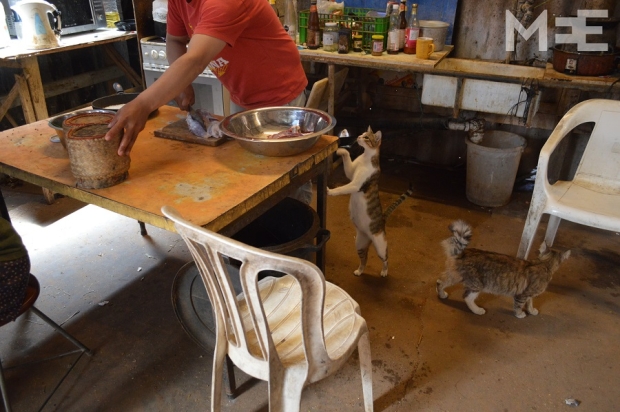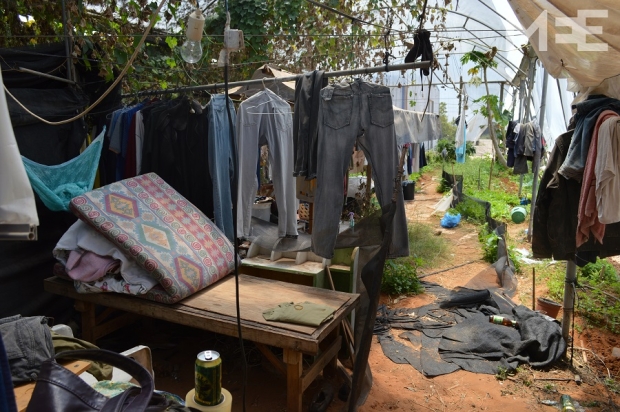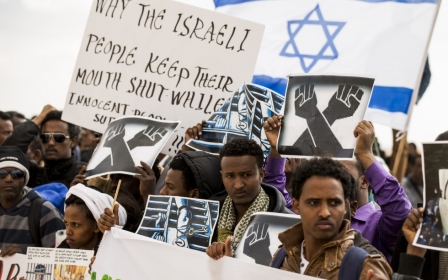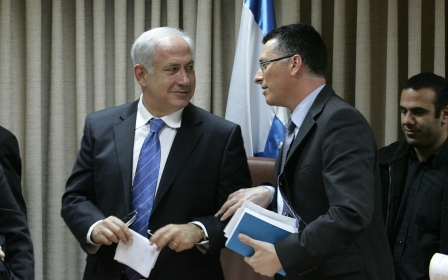Israel’s dirty secret: Inhumane conditions for Thai workers
Netanya, Israel - The cobwebs and grime are, at first, the most striking aspect of the old livestock shed - now a makeshift kitchen and commons area - currently inhabited by a dozen Thai agricultural workers. The walls are rusted and falling down; there is no flooring, just dirt, and there are no doors to the structure. It’s not what most would consider a kitchen, but for the Thai workers on this moshav (farm), it’s the only home they’ve known in Israel.
Thai workers comprise 95 percent of agricultural workers in Israel, with many subjected to illegal working and living conditions. As part of their visa contract, they are tied to the agricultural sector. Now the majority of them remain stuck, paying off debts accumulated to middleman agencies that helped them during the visa process, and with finding employment within Israel.
Middle East Eye recently visited a moshav in North East Israel, which receives workers through these agencies, employing around 100 Thai workers in total.
“Sometimes we just cover our faces with a T-shirt,” one of the workers told MEE about working on the fields where they often spray dangerous chemicals. “Nobody told us how to do the work, the farmer just tells us to go quicker, quicker, for up to four hours at a time. Some of us have suffered from dizziness, nausea and throwing up from the spraying.”
The worker walked to a drawer and held up an old doctor’s mask, brown from use and broken at the string. He explained that this mask was the only form of protection offered to him and his co-workers.
Work days are hard and potentially dangerous, while working hours are long. Shira Maki, a spokesperson for the Knesset Committee on Foreign Workers told MEE that cases like this are typical.
“They aren’t given proper demonstrations, and [the farmers] aren’t teaching them how to use these things and they get hurt a lot of times,” Maki said.
Scared to speak out
At first the workers, who wished to remain anonymous, were hesitant to speak with MEE for fear of repercussions. One man stood outside the rundown kitchen structure at all times, periodically yelling out warnings of any approaching vehicles. Twice during the conversation people scattered and hid, as farm vehicles rumbled past - if spotted speaking out, workers could face dire consequences.
According to workers on the farm, two men who claimed to be police officers rounded up their colleague who originally filed a complaint about the illegal working and living conditions on the farm. From what they have heard since, he escaped on route to the airport where he was to be deported. His whereabouts are currently unknown.
One worker, Sarawut Nguyen, sat hidden inside one of the greenhouses, speaking quietly and visibly nervous.
“I am wary of complaining or speaking about conditions here because my co-worker was taken away, I don’t want to get in trouble. I want to move to a better place but I don’t know who is willing to help,” Nguyen told MEE through a Thai translator.
Gaining help and information about life in Israel and their employment has become a regular difficulty for agricultural workers. Many are given no orientation when they first arrive in Israel, being put to work straight away instead. While being unable to speak Hebrew or English makes it near impossible for many foreign workers to carry out tasks outside of their employment, for example visiting a doctor.
Nguyen and other workers explained that they were still unaware of how to independently visit a doctor. Only in severe cases was a doctor called to the farm, and only at the employer’s discretion.
Living conditions
There remains no respite when the workday is finished and workers return to their lodgings. After working for up to 18 hours a day, labourers can find their beds for the night situated in rundown and unventilated buildings, shipping containers, old livestock sheds, and caravans housing half a dozen workers in each is not uncommon on farms up and down Israel.
On Nguyen’s moshav, many of the workers slept in caravans, tucked inside a greenhouse where temperatures often exceed 50 degrees Celsius.
Each caravan slept up to six workers, had no ventilation and no fans were provided. Some workers were choosing to sleep outside on wooden boards rather than brave the suffocating heat inside.
Situated beside the caravans, outside of the greenhouse and in an old livestock shed was the shared kitchen area. In between prepping a meal for their colleagues, two workers showed MEE around the kitchen. Stray dogs and cats roamed in and out with ease because there was no door to close the room off from the outside. Gas canisters were dangerously exposed and utensils and kitchen equipment were old, broken and stained from years of use. Thick cobwebs were strung throughout and hung in clumps off the high ceilings and walls. Walls were dirty and made up of corrugated metal with holes and gaps clearly visible.
In a corner a worker who, because of respiratory problems, couldn’t bear to sleep in a caravan, was setting up a bed with sheets hung around the sides in an attempt to keep bugs and animals out.
Noa Shauer, coordinator of agriculture workers at workers’ rights organisation Kav LaOved, told MEE that housing workers in green houses, old barns and livestock sheds has become a common practice in Israel, despite its illegality, as farmers attempt to hide their workers and living conditions from view.
“The main idea in this issue is that it becomes far from the eye, the accommodation is somewhere we can’t see, and because we can’t see, it doesn’t bother us,” Shauer said.
Workers explained that their average workday was around 16 to 18 hours, with three days of holiday per year. They have no idea what their actual wage is, and they receive no payslips. The wages are collected by the middleman agency directly from the farmer, while the workers are given a small personal allowance for food and other necessities. However, the amounts deposited into their accounts in Thailand fluctuate for no clear reason.
Speaking to MEE, Kav LaOved speculated that this had much to do with wages passing through multiple hands, with commissions being deducted before being deposited.
For Thai workers, this was not the life they expected in Israel.
“My family do agriculture in Thailand, but I didn’t expect it to be like this, I didn’t expect to sleep in such a caravan or poor accommodation like this; a typical house in Thailand is much more comfortable than what it is like here,” said Nguyen.
Bilateral agreement
In 2011, Israel and Thailand struck a bilateral agreement intended to protect the rights of Thai agricultural workers in Israel, while providing the agricultural sector in Israel with a steady labour force.
Today, some 22,000 foreign workers are employed in the agricultural sector. Yet three years after the bilateral agreement, workers continue to be exposed to exploitative circumstances.
One of the agreement’s main objectives was to outlaw the middleman agencies that recruit Thai agricultural workers in Thailand and charge them hefty fees in return for finding employment on Israeli farms. Because the fees take years to pay off, workers are left vulnerable to abuse and exploitation. Contrary to the agreement, the practice still persists today.
“The whole purpose of the bilateral agreement was to minimise the power of the [middleman] agencies down to zero,” Shauer said. “However politics is politics and the agencies lobbying are very strong and they managed to get a bylaw and approval to still earn some money from the process.”
While direct recruiting of Thai workers in Thailand by these agencies seems to be out of practice, using middleman agencies that charge Thai workers exorbitant fees in exchange for finding work is still the norm.
Moving farms is near impossible for workers, as they must find another employer who is willing to sponsor their visa. Workers who do manage to change employers are, in almost all cases according to Kav LaOved, not registered for a new visa by their new employers and become illegal after three months.
While many workers may want to return home, the debts they have accumulated often binds them in Israel for more than two years just to pay off these initial outlays. This reality still occurs in light of the bilateral agreement that aimed to help abolish, in part, the accumulation of some of this debt.
“If I leave Israel now, I would leave having made no money.” Nguyen said, “I paid a big mediation fee just to be here, it has taken two years just to pay this off, if I left now I would have just paid the debt and that is all, I will have made no money at all. I would have worked for the past two years for nothing.”
Cheap labour
Despite Thai workers being paid less than minimum wage, having their workers’ rights violated and living in illegal conditions, there appears to be little to no government action on the issue.
There are only two inspectors responsible for assessing worker’s housing regulations for the entire country. These inspectors are charged with inspections for both foreign and Israeli workers.
“Even if they send inspectors it’s really difficult because they’re all around the country and they have to get into the farmer’s houses,” Maki said. “And they coordinate with the farmers anyway so [the farmers] can get rid of all the bad things before the visit.”
While inspections occur by government officials, translators are not provided so inspectors cannot talk to workers. According to Kav LaOved, many inspectors are also aware that farmers lock worker accommodation so they cannot enter, but that this is not seen as an issue to tackle. Rather inspectors carry out a symbolic role rather than an actual one.
“The government is very much aware of these violations,” Shauer said. “But for me this whole violation of Thai worker rights is systematic, a system that allows it to happen. If we go into the agricultural sector in Israel we will see that they are not getting enough subsidies from the government, not enough to grow food for the local market. The government is telling farmers unofficially, listen here is your subsidy, cheap labour.”
New MEE newsletter: Jerusalem Dispatch
Sign up to get the latest insights and analysis on Israel-Palestine, alongside Turkey Unpacked and other MEE newsletters
Middle East Eye delivers independent and unrivalled coverage and analysis of the Middle East, North Africa and beyond. To learn more about republishing this content and the associated fees, please fill out this form. More about MEE can be found here.






